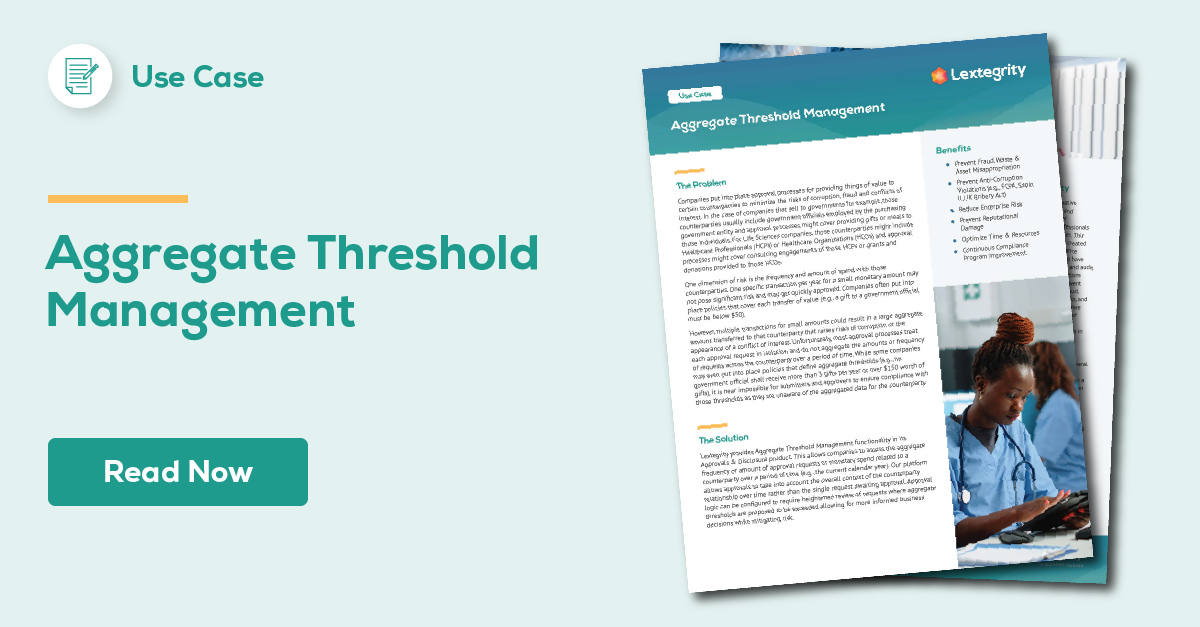Problem
Companies put into place approval processes for providing things of value to certain counterparties to minimize the risks of corruption, fraud and conflicts of interest. In the case of companies that sell to governments for example, those counterparties usually include government officials employed by the purchasing government entity and approval processes might cover providing gifts or meals to those individuals. For Life Sciences companies, those counterparties might include Healthcare Professionals (HCPs) or Healthcare Organizations (HCOs) and approval processes might cover consulting engagements of those HCPs or grants and donations provided to those HCOs.
One dimension of risk is the frequency and amount of spend with those counterparties. One specific transaction per year for a small monetary amount may not pose significant risk and may get quickly approved. Companies often put into place policies that cover each transfer of value (e.g., a gift to a government official must be below $50).
However, multiple transactions for small amounts could result in a large aggregate amount transferred to that counterparty that raises risks of corruption or the appearance of a conflict of interest. Unfortunately, most approval processes treat each approval request in isolation and do not aggregate the amounts or frequency of requests across the counterparty over a period of time. While some companies may even put into place policies that define aggregate thresholds (e.g., no government official shall receive more than 3 gifts per year or over $150 worth of gifts), it is near impossible for submitters and approvers to ensure compliance with those thresholds as they are unaware of the aggregated data for the counterparty.
Solution
Lextegrity provides Aggregate Threshold Management functionality in our Approvals & Disclosures product. This allows companies to assess the aggregate frequency or amount of approval requests or monetary spend related to a counterparty over a period of time (e.g., the current calendar year). Our platform allows approvals to take into account the overall context of the counterparty relationship over time rather than the single request awaiting approval. Approval logic can be configured to require a heightened review of requests where aggregate thresholds are proposed to be exceeded, allowing for more informed business decisions while mitigating risk.
Customers gain increased risk mitigation and operational efficiency with Lextegrity’s Aggregate Threshold functionality. Risks that may arise only in the aggregate, as opposed to within one request, can now be identified and assessed for risk. In the case of gifts and hospitality to an individual government official, that could mean that a government official invited to a dinner an excessive number of times in a year, where each individual meal is reasonable, can still be flagged for review and each meal approval request is no longer viewed in a vacuum with no view of the overall risk. That also means that aggregate threshold policy requirements imposed by the company can actually be operationalized using Lextegrity’s technology.
Results
For Life Sciences companies, aggregate thresholds often are put into place related to consulting or speaker spend with HCPs (e.g., annual speaker cap) or grants and donations with HCOs. These aggregate thresholds or caps are critical to minimizing kickback and anti-corruption risks but can be extremely difficult to operationalize. Lextegrity’s platform allows this data to be leveraged in the approval process for HCP and HCO engagements to operationalize this. This allows Compliance or Legal to intervene and ensure that contracts are not executed that would exceed the aggregate cap put into place.







